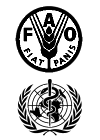
Committees and Task Forces
Committees
The Committees play a significant role in the standard setting procedure. In the Procedural Manual it can be read that the Committees are Subsidiary Bodies of the CAC. This means in practice, that the CAC can appoint different units, that are responsible for the development of a draft proposal (e.g. new standard, or revisision, a guideline or code, and more). When a draft is adopted by the Committee, it is send to the CAC for final adoption. Committees do no vote on proposals; drafts are to be accepted by consensus between members. Besides of Committees, the CAC can also appoint Task Forces. A Task Force is responsible for a single topic and shortliving whereas Committees span a broader field of topics and are more active for a longer time.
In the List of Codex Committees one can select: Active, Renamed and reestablished, Adjourned sine die, Abolished, and Dissolved Committees. Only Active Committees and Task Forces are operational; the others are not active for different reasons. One can learn from this list, that different types of Committees exist, e.g. working on general topics (e.g. Codex Committee on Food Labelling), working on commodities (e.g. Codex Committee on Fats and Oils), and Coordinating Committees (e.g. Coordinating Committee for North America and South West Pacific). A special committee is the Executive Committee with a limited number of Members, with special tasks to assist the CAC.
The Committees and Taskforces have to follow guidelines of the CAC, that are presented in the Procedural Manual. A Committee is assigned to a Member country. That country is responsible for all costs, and must have a Secretariat available that must provide the necessary support. The Committee country is also responsible for a chairperson and rapporteurs of Committee meetings. The Chair and the Secretariat are responsible for organizing physical meetings, where representatives of Codex members and Observers discuss draft proposals and suggestions for new work.
The acronym of a committee in the list links to an overview of the Committee, i.e. its FAO/WHO id (that is used for communication), reference used in reports, the terms of reference describing its main topics, and host country. The latter is relevant, as the Codex Contact Point of that country can then also be addressed for information regarding committee issues. Besides this page provides information regarding meetings, standards, working groups and documents assigned to the committee.
